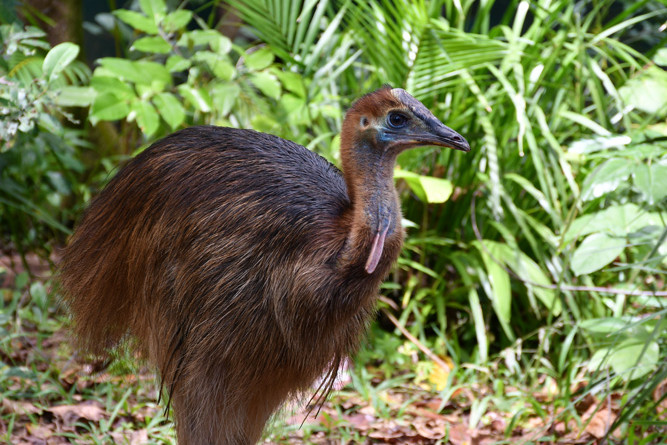Community & Business
13 November, 2022
Cassowaries return home
TWO young cassowaries have finally returned to their home in the rainforest after spending the last several months in rehabilitation for illness and injuries.

A baby southern cassowary chick was found at Wongaling Beach in April last year, displaying signs of illness and wildlife officers immediately took action to save and rehabilitate it.
After unsuccessful attempts to reunite it with its parents, the bird was taken to Garners Beach Cassowary Rehabilitation facility for intense monitoring, care and a couple of months later it was transferred to the Rainforest Reserves Australia Tablelands Cassowary facility.
“The Tablelands facility has a large, forested free-range enclosure that encouraged natural behaviours and reduced the likelihood of the bird becoming habituated to associating humans with food before it was released at Hull Heads National Park as a healthy sub-adult bird,” senior wildlife officer Dinouk Perera said.
“The Department of Environment and Science would particularly like to thank Tropical Vet Services for providing vet treatment and Rainforest Reserves Australia which operates the Tablelands Cassowary Facility.
“We’d also like to thank C4 (the Community for Coastal and Cassowary Conservation) who provide food and care for cassowaries held in the Queensland Government Garners Beach Casso-wary Rehabilitation facility.”
The second cassowary chick was found with a neck injury at Maria Creek just outside El Arish, in April 2022.
The chick’s injury was severe and was operated on at Tropical Vert Services before being monitored at Garners Beach Cassowary Rehabilitation Facility until it’s recent release at Clump Mountain National Park.
The southern cassowary is listed as endangered in the Wet Tropics region with only an estimated 4400 cassowaries left in the wild. To report a cassowary sighting, call 1300 130 372.
Each report will contribute to citizen science aimed at reducing the number of cassowaries killed on roads.
Here is how you can help by being Cass-o-wary!
• Don’t approach cassowaries – they are very unpredictable.
• Don’t approach chicks – the father will be nearby and may defend them fiercely.
• Never feed cassowaries – it is against the law, potentially dangerous for people and has led to cassowary deaths.
• Discard food scraps in closed bins in cassowary country and ensure compost bins have secure lids.
• Slow down and be on the look-out when driving in southern cassowary territory.
• Never stop your vehicle to look at southern cassowaries on the road.
• Keep dogs behind fences or on a leash.
• If you come face-to-face with an aggressive bird, it's important to have some simple strategies to protect yourself. It is best to back away slowly and put something like a tree, a backpack between yourself and the bird, and let it go on its way.


